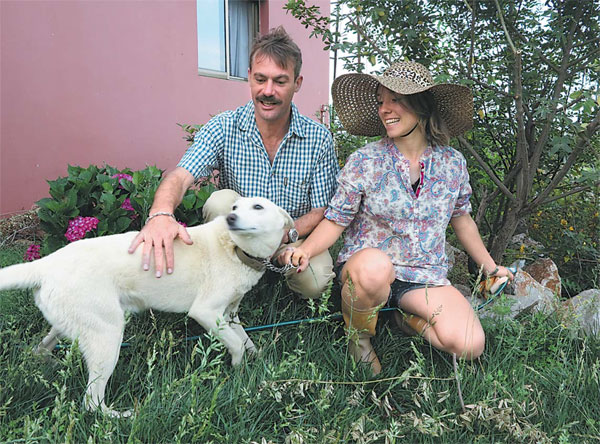Rich pickings for raspberry farm
French grower and his family enjoy the fruits of their labor in Yunnan province
The French have a long and varied association with agriculture in Yunnan province.
In 1860, a French missionary built a church in Deqin county and planted grape seeds brought from France. Today, the province is considered the sole repository for the rare rose honey grape, extinct in France for more than 100 years.
|
Martin Dabilly and his wife Claire live at the farm's cottage with their pet dog Milou. The profits from the rented Chinese farm have been reinvested in expansion. Chen Liang / China Daily |
Another French missionary, who left Vietnam to settle in Bingchuan county in 1892, planted coffee seeds near his church, and now the province is China's largest coffee-growing region.
More recently, Martin Dabilly has been making Yunnan famous for its raspberries.
In November 2008, he planted seedlings of a French variety of the fruit on 4 hectares of land in Longyuan village, about 50 kilometers northeast of the provincial capital, Kunming. Today, raspberries grown on his farm, which has been expanded to 15 hectares, are sold in many major Chinese cities.
Dabilly, who is from a winemaking family and studied agriculture at a university in Toulouse, came to China in 2005 to work on a French-run kiwi farm in Dujiangyan, Sichuan province.
During his first two years, he says he discovered that fruit grown in China had high yields, but were of poor quality.
"I wondered why China had to import expensive foreign fruit, and why I couldn't find raspberries on the market," he says in his office at Meiming Raspberry Farm.
He says Russians introduced raspberries to Northeast China in the 1930s, and the region now cultivates the fruit on a large scale, especially in Heilongjiang province. Yet most are frozen and exported to the United States.
"There were no raspberries on the Chinese market, but I knew I could grow high quality raspberries. I saw an opportunity," the 38-year-old says.
In 2007, he declined an offer by his company to transfer him to France, and instead, together with his father, started looking for a suitable location for his raspberry farm, focusing on Sichuan, Yunnan, and the Xinjiang Uygur autonomous region.
"To grow raspberries requires moderate temperatures, moisture, and a lot of sunshine," he says. "Sunshine is a problem in Sichuan, while Xinjiang's winter is too long, and the place is too far away from any major cities, which is a problem for distribution. We decided to go to Yunnan."
Dabilly first noticed the flat fields of Yunnan's Songming county while traveling on an expressway toward Kunming, and in 2008 he paid 10,500 yuan ($1,710; 1,528 euros) a hectare per year to rent the land for his farm in Longyuan. Last year, the rent increased to 37,500 yuan a hectare.
"The weather and distance (to major cities) are both good for running a farm," he says. "Many people have come here to grow vegetables."
The harvest for raspberries is from May to October, and Dabilly says Meiming yielded 40 metric tons of the fruit last year, of which they sold 38 tons.
The French farmer says the biggest challenges to his business have been marketing - "few Chinese know what a raspberry actually is" - and finding trustworthy supermarkets, distributors and hotels to work with.
At the beginning, Meiming signed sales agreements with several large supermarkets in Beijing and Shanghai, but Dabilly called that a big mistake.
"According to our contract, we should have received payment within two weeks, but it turned out to be closer to six months," he says.
Today, the farm deals mainly with wholesale distributors and some five-star hotels and restaurants. Dabilly says foreign executive chefs at several top hotels in Shanghai have become regular customers.
Growing pains
As raspberries are a fragile fruit, harvests must be handled with extreme care, and Dabilly says he generally hires 70 extra workers from nearby villages to handpick and pack the produce.
"Most are women, as the village men have mostly migrated to large cities for work," he says. "The women are more careful with the berries anyway."
After being packed, the fruit is immediately placed in cold storage and kept at a temperature of 2 C until it is transported in a refrigerated truck to customers in Kunming, or to the city's airport, which is only an hour's drive from the farm, "so customers in other cities can have the freshest raspberries", the farmer says.
He says raspberries stay fresh for only three to four days, which makes it difficult to export them unless they are frozen.
Thomas Dabilly, the farmer's older brother, says Meiming's fruit can be eaten without being washed first, as it is grown to European standards using pesticides mostly used on organic farms in France.
Based in France, he is in charge of the farm's finances and visits regularly. Martin Dabilly is responsible for growing and marketing the produce.
The brothers' father also helps out six months of the year. He uses the surplus raspberries to make liquor using a traditional French process. The beverage is named after the brothers' great-grandfather, Marc.
The profits from the farm have been reinvested to allow for expansion, which has included leasing more land and building a research laboratory.
In one corner, Martin Dabilly has also built a cottage and a fenced garden, which he and his wife, Claire, share with their pet dog two or three days a week. The rest of the time they live in Kunming, where Claire is studying Chinese traditional medicine.
"I have lived in China for 10 years. I love China," the French farmer says. "I have good relationship with the local government, but I don't go looking for the government's help. The French government has not done anything for us. This is a Chinese company."
Contact the writers through chenliang@chinadaily.com.cn



















